
by Steve | Sep 22, 2016 | In the News, Perspective E-Newsletter
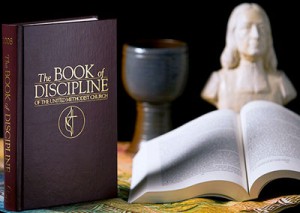 With the election of the Rev. Karen Oliveto as a bishop of The United Methodist Church, a pastor who is married to another woman and therefore unqualified to assume the office, it is clear to most people that the church has reached a crisis point.
With the election of the Rev. Karen Oliveto as a bishop of The United Methodist Church, a pastor who is married to another woman and therefore unqualified to assume the office, it is clear to most people that the church has reached a crisis point.
Thousands of people across the connection have endorsed a statement that will be shared with the Council of Bishops. To read the statement and add your endorsement, click HERE.

by Steve | Sep 22, 2016 | In the News, Perspective E-Newsletter
 By Walter Fenton-
By Walter Fenton-
Evangelical United Methodist Church (EUMC), one of the denomination’s fastest growing large churches, has decided to withhold paying its annual conference and general church apportionments. The Greenville, Ohio, congregation reached its decision in late August.
“The open defiance by annual conferences to ignore the Book of Discipline and defy the Word of God, and the Western Jurisdiction’s decision to elect a gay bishop compelled us to act,” said Matt Hamilton, chairman of the congregation’s leadership board.
According to the blogger Len Wilson, in 2014 the West Ohio church was the third fastest growing UM congregation with worship attendance over 1,000. It now averages approximately 1,200 to 1,300 people in attendance at five weekend worship services in a rural community with a population of just over 13,000.
“In the layperson’s workplace, if you sign a contract stating you’ll fulfill a certain job within a corporation, and then you fail to uphold your duties, you’d be terminated,” said Jill Steinbrunner, another member of the congregation’s leadership board. “EUMC is looking for the bishops to display clear and definitive support of biblical truths … and holding clergy accountable to their ordination vows and our Book of Discipline.”
Over the past several years the West Ohio Annual Conference, like many others, has witnessed challenges to the denomination’s sexual ethics and its teachings on same-sex marriage. In 2010, on a very narrow vote (948 to 920), the conference elected an openly gay man as its conference treasurer. He has been re-appointed to the post every year since. And earlier this year, just three days before the convening of General Conference, UM Pastor David Meredith made statewide news when he married his male partner at Broad Street UM Church in Columbus, Ohio. A complaint was filed in the case, but to date there has been no word of its resolution.
“EUMC has been increasingly alarmed at the way UM leaders have chosen to disregard the tenants of our church,” said Steinbrunner. “It has put more emphasis on maintaining unity than on teaching biblical truth and saving souls.”
The church recently joined a diverse mix of 20 other congregations in Darke County, Ohio, in an effort to share the Gospel with unchurched people. The initiative, called Time to Revive, has resulted in over 500 people making decisions for Christ.
“I am excited,” said Steinbrunner, “that the church is not only growing in the number of attendees, but more importantly, we’re seeing people growing in their depth of faith and knowledge of Christ. We’ve had dozens of people volunteer to meet one-on-one with people who have recently become Christians. It’s very exciting to witness.”
The congregation has a history of paying 100 percent of its apportionments, and both Steinbrunner and Hamilton said the board reached its decision reluctantly and after months of discussion and prayer.
According to Hamilton, the leadership team decided it could no longer, in good conscience, support a conference and general church that is failing to abide by its own polity and teachings.
He explained that the leadership team unanimously voted to withhold the apportionments. It then held a church-wide membership meeting to solicit feedback before moving forward. “Members were overwhelmingly supportive of our decision,” he said.
“If the bishops would enforce the Book of Discipline we could begin paying apportionments again,” he added. “But right now the general church is in chaos. In fact, our people feel like the bishops’ inability to maintain good order in the general church makes it more difficult for us to do our ministry. We’ll continue to do what we’ve been doing, but the bishops aren’t helping.”
Walter Fenton is a United Methodist clergy person and an analyst for Good News.

by Steve | Sep 12, 2016 | In the News, Press Releases
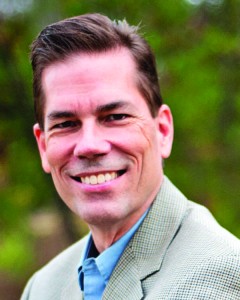 By Thomas Lambrecht
By Thomas Lambrecht
When the New England Annual Conference passed a resolution at its recent gathering in defiance of the standards of the global United Methodist Church regarding ordination and homosexuality, a “question of law” was immediately requested.
When an annual or jurisdictional conference takes an action that appears contrary to the Book of Discipline, it can be challenged through a question of law requesting a ruling clarifying the legality of the action in question. It is first ruled on by a bishop and then reviewed by the Judicial Council. The bishop and the Judicial Council have the authority to overrule conference actions, and the Judicial Council’s ruling becomes the accepted understanding of church law.
In response to an “Action of Non-Conformity with the General Conference of The United Methodist Church” adopted by the New England Annual Conference on June 17, Bishop Sudarshana Devadhar has ruled in a question of law that the resolution is “in violation of the Discipline.”
The resolution stated that “the New England Annual Conference will not conform or comply with provisions of the Discipline which discriminate against LGBTQIA persons.” In short, the conference rejected the global church’s sexual ethics, standards on ordination, and its teachings on marriage.
The New England resolution was the first of five annual conferences pledging non-conformity with United Methodist teaching and policy. The others were, Desert Southwest, California-Nevada, Pacific Northwest, and California-Pacific. The Western Jurisdiction also adopted a resolution nearly identical to the New England one, as well as a resolution calling upon local churches and annual conferences in the jurisdiction to “not [comply] with the Book of Discipline whenever it denies full inclusion of a person based on their sexual orientation or gender identity in the life, ministry and leadership of The United Methodist Church.” If the Judicial Council upholds Bishop Devadhar’s ruling, all the similar resolutions adopted by other conferences would also be null and void.
The New England resolution contained a provision that conference members would “not participate in or conduct judicial procedures related to the Discipline’s prohibitions against LGBTQIA persons” that was ruled to violate the Discipline. A provision to “realign [the conference’s] funding to reflect these commitments, using no reserve funds to pay for judicial procedures related to the Discipline’s prohibitions against LGBTQIA persons” was also ruled to be in violation of the Discipline.
The resolution called for the conference to offer the same benefits to clergy and employees in same-sex marriages as are available to heterosexual marriages and their families. Devadhar ruled that this provision was legal, since conference benefits are not covered in the Discipline. However, a brief filed by the Rev. Michael Pike, the person who asked the question of law that led to Devadhar’s ruling, argues that the “conference may not offer benefits that contradict United Methodist Church policy.” To offer such benefits would “in effect condone behavior that The United Methodist Church disapproves.”
Bishop Devadhar acknowledged that his ruling was “a painful one to make.” He explained that, “as a United Methodist Bishop, I cannot challenge what I believe to be an unjust law by approving an illegal law.” Although not supportive of United Methodist teaching on marriage and human sexuality, Devadhar acted with integrity in this instance. We wish all our bishops and clergy would exhibit similar integrity.
Northeastern Jurisdiction Resolution
A resolution initially titled, “Stop the Church Trials: A Moratorium by Bishops Within the Northeastern Jurisdiction,” was passed by the Northeastern Jurisdictional Conference on July 14. The resolution was revised several times (including deleting the title), but ended by requesting “all CFA’s of the Annual Conferences of the jurisdiction to state that there are no funds available for initiating of investigations and trials based upon the sexual orientation or marital status of faithful United Methodists or involving clergy for conducting same-sex weddings.” The resolution passed by more than a two-thirds majority.
After the resolution was adopted, a question of law was raised. Bishop Mark Webb has ruled that the resolution “requests the CFAs and the annual conferences to violate Church law or, alternatively, discourages the enforcement of Church law. Either way, the Resolution would be null, void and of no effect.” In addition, Bishop Webb found that the “Resolution would also negate, ignore and violate … provisions in the Constitution,” making it unconstitutional.
Bishop Webb’s ruling will also be reviewed by the Judicial Council next April. If his ruling is affirmed, it would apply to any future resolutions attempting to negate or violate the Discipline in this way.
The Real Question
Given that these rulings are likely to be upheld by the Judicial Council, what does it mean that the resolutions of non-conformity will be ruled null and void? Will the annual conferences, bishops, and jurisdictional conferences that have publicly decided not to live within the bounds of the Discipline now suddenly acquiesce to follow Judicial Council rulings with which they disagree?
It is more likely that annual conferences, bishops, and jurisdictions will continue to ignore the parts of the Discipline that they disagree with, exacerbating the tensions and divisions within United Methodism. As Dr. Ted Campbell said recently at the World Methodist Conference, “When annual conferences declare that they will not follow the law of the church, I think that is in fact a division.”
Thomas Lambrecht is a United Methodist clergy person and the Vice President of Good News.

by Steve | Sep 12, 2016 | In the News, Press Releases
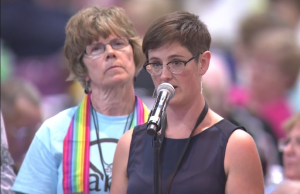 By Walter Fenton-
By Walter Fenton-
Bishop Julius Trimble has dismissed a complaint filed against a United Methodist clergywoman who announced during a plenary session of the 2016 Iowa Annual Conference, “I am a self-avowed practicing homosexual. Or in my language, I am out, queer, partnered, clergy.”
The Rev. Anna Blaedel, a campus minister at the University of Iowa Wesley Center, made her announcement during a moment of personal privilege during a June 4 plenary session. Shortly after her address, three of her clergy colleagues prepared a complaint against her and submitted it to Trimble.
Trimble informed the complainants on the second to last day of his tenure as bishop of the Iowa Episcopal Area that he was dismissing their charge. As of September 1, Trimble is now the presiding bishop of the Indiana Episcopal Area.
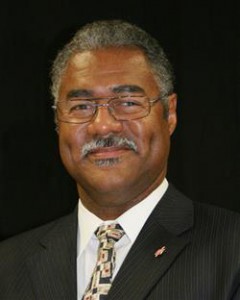
Bishop Julius Trimble
Two of the three complainants in the case, the Revs. Craig Peters and Ben Blanchard, were only mildly surprised by Trimble’s decision. They noted that other bishops are also trying to quietly resolve cases related to the church’s sexual ethics and teachings on marriage, and that the resolutions often allow clergy members to keep their ministerial credentials and remain under appointment with no blemish on their service record.
[In two separate pieces released this week (HERE and HERE), United Methodist News Services’ Heather Hahn reports on two similar cases.]
But Peters and Blanchard also pointed out their laity are mystified by a system that allows clergy to openly defy its standards and then suffer no consequences for their defiance.
In order to dismiss a complaint a bishop needs the consent of his or her cabinet (i.e., the district superintendents serving the annual conference). According to Peters, Trimble told him that he had the “general consent” of his eight cabinet members, but he also said the bishop would not say whether that meant all eight approved his decision or just a simple majority of them.
The Book of Discipline requires a bishop to put in writing for the complainants the reasons why he or she has decided to dismiss a complaint. Both Peters and Blanchard report they have received no such statement from Trimble.
Bishops are also charged with giving “due regard to the interests and needs of the complainants” when deciding to dismiss their complaint. Both Peters and Blanchard said Trimble failed to do so. They believed they were acting as representatives of a larger body of clergy and laity in their annual conference who are concerned about integrity and accountability with respect to the UM Church’s sexual ethics and teachings on same sex marriage.
“I believe the bishop was hoping for a swift and quiet just resolution,” said Blanchard. “But when it became apparent that would not happen he dismissed it as an alternate way of keeping it quiet.” To date, Trimble has not made a public statement regarding his actions, and the Iowa Annual Conference Communications Office is either unaware of Trimble’s decision or has decided not to report on the matter.
In an open letter to “Friends and Colleagues” regarding Trimble’s decision, Peters said he interpreted the bishop’s decision as follows: “We find ourselves in an unprecedented ‘time of transition.’ … We must be willing to offer grace to one another, who for conscience sake can no longer follow the Book of Discipline. This evidently would include those who, for conscience sake, feel they can no longer, with integrity, pay their church apportionments.”
Blaedel remains at her appointment at the University of Iowa Wesley Center, and newly elected Bishop Laurie Haller is now presiding over the Iowa Episcopal Area.
Walter Fenton is a United Methodist clergy person and an analyst for Good News.

by Steve | Sep 7, 2016 | In the News, Perspective E-Newsletter
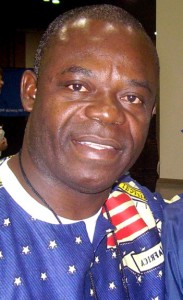 The Rev. Jerry Kulah, West Africa Central Conference Coordinator of the UMC Africa Initiative and the dean of the Gbarnga School of Theology, a United Methodist seminary in Liberia, is set to speak at the WCA launch event Friday, October 7.
The Rev. Jerry Kulah, West Africa Central Conference Coordinator of the UMC Africa Initiative and the dean of the Gbarnga School of Theology, a United Methodist seminary in Liberia, is set to speak at the WCA launch event Friday, October 7.
Jerry is an ordained United Methodist clergyperson and has served as both a local church pastor as well as the Monrovia District Superintendent overseeing 35 churches. He has represented the Liberia Annual Conference as a delegate to General Conference.
With his miraculous story of escaping death during the Liberian civil war, Jerry has been instrumental in organizing Liberia’s non-denominational National Day of Prayer and is widely regarded as one of its most influential Christian leaders. He was also instrumental in bringing the medical mission Mercy Ships to Liberia that has blessed hundreds in need of medical services that would otherwise be out of reach.
Jerry’s sermon, “Methodists at the Crossroads,” inspired hundreds of people at the first worship service ever hosted by Africans at the 2016 General Conference. We are thrilled to have Jerry join us in Chicago.
To register for the launch event, click HERE.

 With the election of the Rev. Karen Oliveto as a bishop of The United Methodist Church, a pastor who is married to another woman and therefore unqualified to assume the office, it is clear to most people that the church has reached a crisis point.
With the election of the Rev. Karen Oliveto as a bishop of The United Methodist Church, a pastor who is married to another woman and therefore unqualified to assume the office, it is clear to most people that the church has reached a crisis point.




